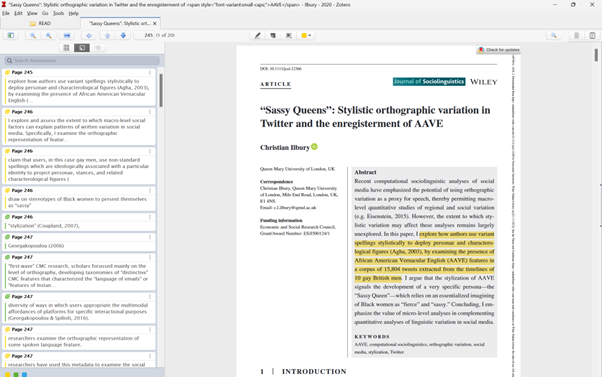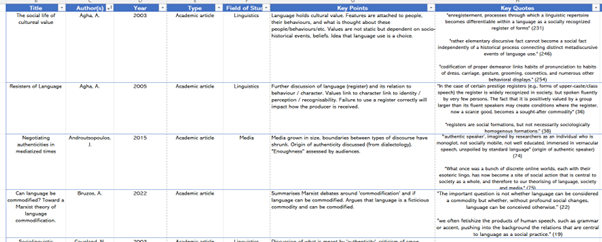Dissertations: The Declassified Survival Guide
Published: 24 April 2023 | Updated: 25 April 2023 | By: Jay, Student Content Creator | 4 min read
Check out these important pieces of advice from Jay, our Student Content Creator, about writing a dissertation!
In many ways, writing a dissertation is similar to running a marathon. It’s a long and tiring journey and, just as you have to train and prepare for a marathon, a dissertation requires the same. For that reason, I’ve put together some important pieces of advice I’ve gathered throughout writing my dissertation, in the hope of helping someone writing their dissertation in the future. If you follow this advice from the start of your project, I can promise that crossing the dissertation ‘finish line’ will be that bit easier.
Start Early
Starting your dissertation early will, in fact, help you in the long run. Admittedly, this is the most obvious tip that you could be given, and it’s something you’ll hear from every member of staff you come into contact with. However, as a student, I know that it’s all too easy to push off starting a deadline, especially one that seems so far in the future. You might even think that your lecturers are exaggerating when they say the sooner the better.
As a student, I can promise you that starting early does help. I pushed off my dissertation start date by just a few weeks and that’s something I’ve come to regret. In the initial stage of your dissertation, the most important thing you can do is narrow down a specific topic. The sooner you do this, the better your life will be. I know how unappealing it seems to think about your dissertation over summer, but make time to look through past modules’ work to find what interested you, have a search from the library website, and you’ll thank yourself later.
.png?width=1024&height=513&name=Blog%20In-body%20(69).png)
Choosing a Topic
As mentioned, choosing your dissertation’s topic is the most important step at the start of your dissertation journey. For the most part, the topic you choose won’t change significantly during the course of your project. That means you’ll be spending the best part of a year studying the same thing – researching, reading, writing, over and over. To save yourself from burning out, it’s essential that you choose your topic carefully.
My top tips for choosing a topic would be the following:
- Make sure you’re interested in what you’re doing. That way, you’ll be more invested in finishing the project than one you picked in a panic or out of convenience.
- Be ambitious, but don’t get too carried away. Your topic should give you plenty to write about, but ensure that you stay within your limits. Some concepts are just too broad to tackle in ten thousand words.
- Find your gap in the research. The best dissertations contribute something unique! Obviously, for undergraduate dissertations, you’re in no way expected to redefine your field of study. But by finding your niche, you can contribute something new, no matter how small!
.png?width=1024&height=513&name=Blog%20In-body%20(68).png)
Academic Reading: Referencing and Note Taking
Of all the things I’ve learnt while writing my dissertation, this is the one thing I wish I could tell my past self sooner. Dissertations require a lot of academic reading to provide the basis for your study, and this academic reading is often information-dense. Throughout the process of your dissertation, you’ll be reading just as much, if not more, than you’re writing. Personally, I was reading literature for months before I wrote a single word.
One of the kindest things you can do for yourself in the process of your dissertation is to keep track of your readings from the get-go. The best way to do this is through a referencing software. By doing this, you’ll never have to search through your laptop’s files in a panic for a reading you saved – these pieces of software store them all in one place. Additionally, they make the final steps of referencing so much easier. It entirely rules out the stress over the correct place to put a comma in your bibliography, as well as ensuring that no plagiarism takes place due to a mistake. In referencing.
I personally use Zotero to both take notes on my readings and to ensure accurate referencing. By pressing an add-on on Google Chrome, Zotero saves a PDF version of almost any reading you can find online through the Newcastle Library, alongside the necessary information for referencing. If the PDF is compatible, Zotero allows users to highlight sections of text, colour-code, make notes and more.
Detailed, accurate and consistent note-taking is the best way to ensure you don’t have to waste time rereading a useful journal article simply because you forgot what it said. Trust me, in two months’ time you won’t remember why the sentence you highlighted was so important.

I also recommend keeping track of the most important things you read all in one place – for me, this meant making an Excel spreadsheet to write down brief summaries and key quotes. This saved a lot of time while writing as I could have everything I needed most in one place.

Writing
Unfortunately, the actual writing process of a dissertation is the hardest section to offer advice for. The layout of your dissertation will vary by subject and what works best for your project, making it hard to offer specific advice. Despite that, though, I think there a few universals regardless of degree programme.
A blank page is your worst enemy. Starting is by far the worst part, and if you’re anything like me, you’ll find yourself rewriting your first sentence endlessly, never progressing further. I’ve learnt that the best thing to do is let your first draft be bad: that’s what first drafts are for. By getting words on the page, you’ve jumped the first hurdle. It would be ridiculous to expect your dissertation to be perfect first-try, and so you should give yourself the grace to improve over time.
While writing, I’ve often found that I have to leave paragraphs half finished. One simple tip that’ll save you from serious blunders is using the highlight feature to make it very clear where you need to go back to. Although you should be proof-reading your dissertation before you submit it, it’s best to make life easier for yourself just in case.
.png?width=1024&height=513&name=Blog%20In-body%20(67).png)
Looking After Yourself
I’ve found that looking after myself during my dissertation is a combination of typical self-care routines, such as getting fresh air and eating well, and some that only relate to my dissertation. Since I’m sure we all know the stereotypical self-care suggestions, I won’t repeat those – though if you needed suggestions or further support, you should always turn to the Newcastle University website.
The best way I’ve found to look after myself during my dissertation is through setting boundaries. Know when and where you plan to be in ‘work mode’, and when to turn that off. Without that firm boundary, I find that I end up in a ‘no man’s land’ between productivity and rest, which is the worst of both worlds. For example, I know that I work best at the library or at my desk. Despite how much I wish I was able to be productive in bed with TV on in the background, this simply doesn’t work for me. By setting that boundary, I get to go to bed and watch TV on evenings, knowing I’ve done my best.
Another thing that’s acted as a lifeline during my dissertation is simply talking to others about the project. Talk to your friends, family, course mates, dissertation supervisor… quite literally, anyone who’ll listen. Through the simple act of talking to others, you move ‘out of your head’ and into the real world. Not only is this better for your mental health (unsurprisingly, pulling an all-nighter in the library is bad for you), but it’ll likely make your project better in the long run. Sometimes all it takes is a fresh viewpoint to show you something you’d have otherwise missed.
In Summary…
There’s a lot to consider while writing your dissertation, more than one blog post can cover, especially from my own subjective viewpoint. I’d recommend looking at the Academic Skills Kit for further resources that might help you along your way.
I think it’s important to leave on a positive note. While dissertations are difficult, often stressful, and a huge amount of work, they’re also a testament to everything you’ve achieved during your time at university. Although mine isn’t quite finished yet, I’m already certain it’ll be a huge weight off my shoulders when it’s submitted, as well as being a piece of work I can use to demonstrate my capabilities for years to come.